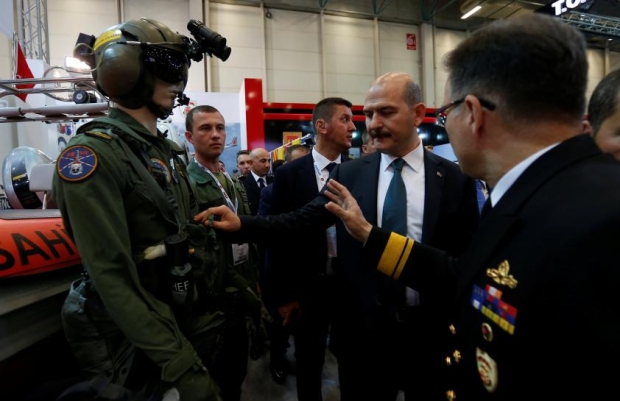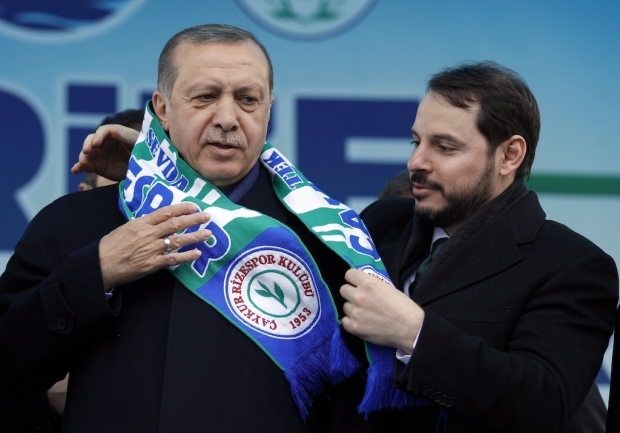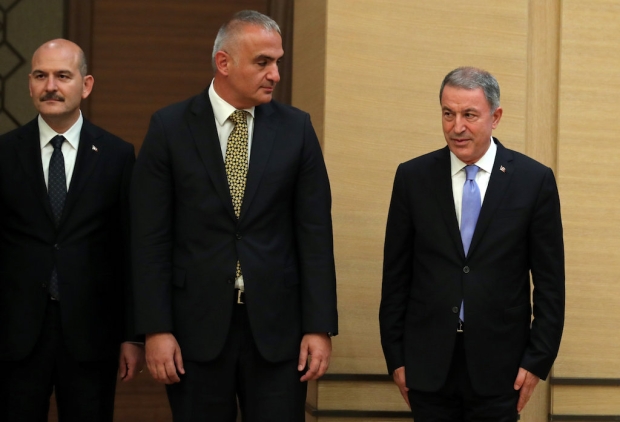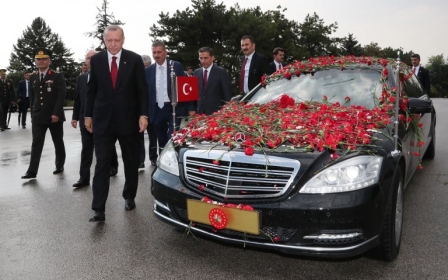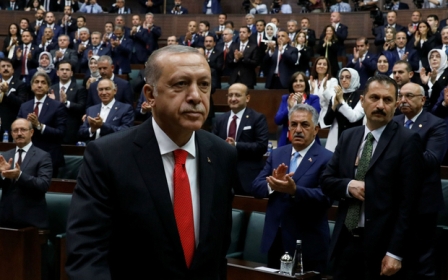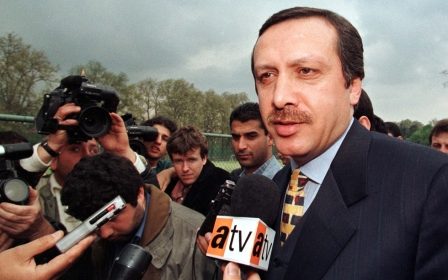A closer look at Turkey's new cabinet
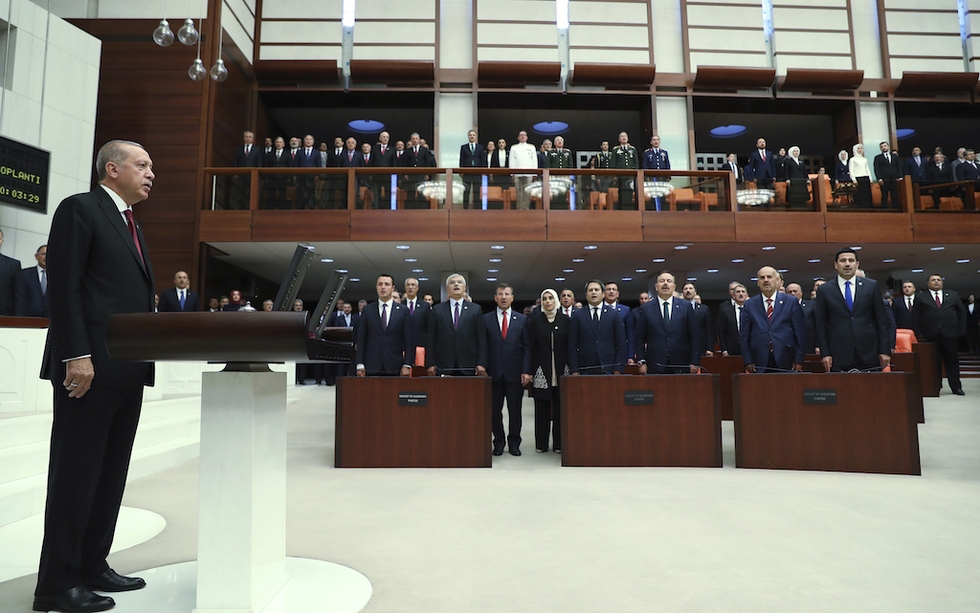
Recep Tayyip Erdogan on Monday named his first cabinet under the new constitutional system which sees the powers of the Turkish President greatly enhanced.
Under the new system, MPs are disqualified from taking ministries unless they resign first, opening the door for less traditional candidates.
Here is a rundown of what to expect from the new cabinet.
Outspoken Soylu
Among those who have remained in their old cabinet posts is Suleyman Soylu. As interior minister, a post he has held since August 2016, he has overseen the operations conducted by the security forces against the outlawed Kurdistan Workers' Party (PKK) in Turkey.
He is known for his heated speeches against the pro-Kurdish opposition People's Democratic Party (HDP) and its members, who are accused of having links to the PKK.
He was criticised when he accused the main opposition party, the Republican People's Party (CHP), of “supporting terrorism”.
On Tuesday, as Soylu took his oath in the parliament, CHP MPs left the grand assembly hall in protest.
Notably, Erdogan hasn’t named any Nationalist Movement Party (MHP) members as ministers, despite their alliance in parliament helping him retain majority control of the chamber.
Erdogan’s AKP and the ultra-nationalist MHP set up an electoral alliance for the 24 June elections, with the MHP supporting Erdogan as their presidential candidate.
They declared their alliance would continue in parliament since neither has the majority to legislate alone. The AKP now has 290 MPs, while the the MHP has 49 seats in the 600-seat parliament.
Erdogan's son-in-law holds the purse strings
Former energy minister and Erdogan’s son-in-law, Berat Albayrak, has been promoted to a newly powerful economic post. He is now the minister of finance and treasury, a new ministry which merges all the bodies concerned with economic management and financial policy.
Before being appointed energy minister in 2015 - when he was first elected to parliament - Albayrak was a businessman. Since taking office in the cabinet, he has travelled with Erdogan on most of the president's official visits abroad.
Markets did not respond well to the news of Albayrak's appointment. On Monday night, the Turkish lira fell around 3.5 percent to 4.71 liras against the US dollar.
As energy minister he supported the founding of Turkey’s Wealth Fund, which reportedly has a budget of $200bn, including a portion of the funds of Turkish Airlines, Turk Telecom, two of the biggest state banks, Turkish Petroleum Company and Petroleum Pipeline Company, Turkey’s Post and Telegraph Organization, and Turkish Maritime Enterprises.
The project has not led to any obvious positive effects on Turkish economy so far. Now, Albayrak will lead both the Wealth Fund and the treasury.
Erdogan’s vice president, Fuat Oktay, is also on the executive boards of both Turkish Airlines and Turk Telecom.
Also alarming for the markets was a new decree allowing the president to appoint the new governor of the Turkish Central Bank.
When Erdogan told Bloomberg in May that he intended to take more responsibility for monetary policy and that he expected the central bank to heed his calls for lower interest rates, the Turkish lira hit a record low against the dollar.
However, despite his calls for lower interest rates, the central bank increased the rates to tame inflation. Then-deputy prime minister Mehmet Simsek, who was responsible for economic policies, tried to sooth concerns a couple of days later, saying: “We understand the worries that investors might have. The central bank showed that it is independent and it would do whatever is necessary when it is necessary.”
Erdogan, who calls himself the enemy of interest rates, has excluded the economically orthodox Simsek from the new cabinet.
Turkey’s new cabinet faces some challenges regarding the economy, such as high inflation rates, the worries of foreign investors, the decreased value of Turkish lira, a large current account deficit and budget deficit, all problems which have worsened in the last couple of months.
Elsewhere, the new minister of trade, Ruhsar Pekcan, is one of only two female ministers in the cabinet and a successful businesswoman. She has experience working on the Turkey-Iraq, Turkey-Libya, Turkey-Jordan and Turkey-Syria business councils.
The new energy minister, Fatih Donmez, is one of the few bureaucrats in the new cabinet. He was previously known for his influence on tenergy politics and his close ties with Albayrak.
Defence handed to the army
Another major surprise in the new cabinet is Hulusi Akar. Chief of General Staff since 2015, he has now been appointed as the new defence minister.
Akar is a controversial figure who was kept hostage by coup plotters during the attempted takeover. After hours of being kept captive, he landed in the prime minister's office in a helicopter with a pro-coup commander in the same aircraft. The pro-coup commander was arrested immediately.
Sources from Turkish intelligence and army, who spoke to Turkish media, claimed that he had received reports on the coup attempt on the same day, but didn’t do enough to stop it.
A week after the coup attempt, Erdogan was asked in an interview if he would dismiss his chief of staff. His answer was: “Now we are in a transition period. We have a saying, ‘you do not change your horse halfway down the road',” in reference to the purge being carried out in the military following the attempted coup.
Since then, Erdogan has never left Akar behind when going on a trip abroad.
Thousands of military personnel were dismissed or detained after the coup attempt. Akar’s secretary and aides were also arrested on accusations of supporting the coup.
Akar’s appointment as defence minister is the first time in modern Turkish history a chief of staff has assumed the position. The army, which has conducted several coups and overthrown many democratically elected governments since 1960, used to be very powerful and influential on the country’s politics.
The only chief of staff to enter politics before was Dogan Gures, known for his violent operations against the PKK. He joined a nationalist right-wing party in 1994 after his term in the office ended.
Akar’s appointment to the ministry, while still on duty, to work with a president who calls himself conservative, shows the changing balance of power in Turkey.
Familiar faces
One of the more familiar AKP faces is justice minister Abdulhamit Gul, who has been in office since July 2017. During his tenure, thousands of civil servants have been dismissed as part of the crackdown against alleged followers of Fetullah Gulen in the wake of the 2016 coup attempt. Gulen is accused of being responsible for the 15 July coup attempt.
Another is foreign minister Mevlut Cavusoglu. He has held his seat as minister since 2014 and is viewed by some as a figure of minor importance, since foreign policy is fully controlled by Erdogan and his foreign policy advisers.
Technocrats enlisted
In an attempt to tackle areas that his Justice and Development Party (AKP) has been struggling in, Erdogan has appointed a number of well-known and successful academics and business people to his cabinet.
These technocrats, who are mostly close to AKP, are a sign of Erdogan’s plans to reform ministries such as education, health, culture and tourism, agriculture and forestry.
Though many are traditonal AKP allies, eyebrows were raised by the appointment of Professor Ziya Selcuk as education minister - someone who has, in past, been critical of the AKP's educational policies.
Despite this, Selcuk, who is founder of one of the most successful private schools in Turkey, has worked with AKP governments as an adviser from time to time.
Students and teachers on social media said they could finally be hopeful about the country’s educational system, which is in flux almost every year along with the content of the high school and university entrance exams.
Other than the technocrats, Erdogan appointed four ministers from the previous government, who had to resign in order to take their oaths as ministers in the new government.
Middle East Eye propose une couverture et une analyse indépendantes et incomparables du Moyen-Orient, de l’Afrique du Nord et d’autres régions du monde. Pour en savoir plus sur la reprise de ce contenu et les frais qui s’appliquent, veuillez remplir ce formulaire [en anglais]. Pour en savoir plus sur MEE, cliquez ici [en anglais].


